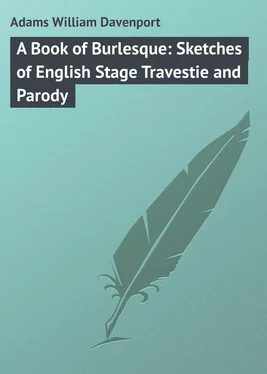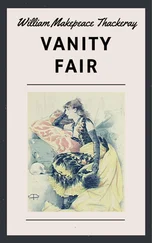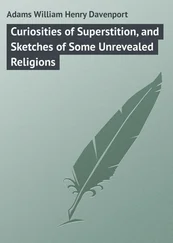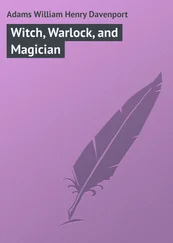William Adams - A Book of Burlesque - Sketches of English Stage Travestie and Parody
Здесь есть возможность читать онлайн «William Adams - A Book of Burlesque - Sketches of English Stage Travestie and Parody» — ознакомительный отрывок электронной книги совершенно бесплатно, а после прочтения отрывка купить полную версию. В некоторых случаях можно слушать аудио, скачать через торрент в формате fb2 и присутствует краткое содержание. ISBN: , Жанр: foreign_prose, на английском языке. Описание произведения, (предисловие) а так же отзывы посетителей доступны на портале библиотеки ЛибКат.
- Название:A Book of Burlesque: Sketches of English Stage Travestie and Parody
- Автор:
- Жанр:
- Год:неизвестен
- ISBN:http://www.gutenberg.org/ebooks/47150
- Рейтинг книги:5 / 5. Голосов: 1
-
Избранное:Добавить в избранное
- Отзывы:
-
Ваша оценка:
- 100
- 1
- 2
- 3
- 4
- 5
A Book of Burlesque: Sketches of English Stage Travestie and Parody: краткое содержание, описание и аннотация
Предлагаем к чтению аннотацию, описание, краткое содержание или предисловие (зависит от того, что написал сам автор книги «A Book of Burlesque: Sketches of English Stage Travestie and Parody»). Если вы не нашли необходимую информацию о книге — напишите в комментариях, мы постараемся отыскать её.
A Book of Burlesque: Sketches of English Stage Travestie and Parody — читать онлайн ознакомительный отрывок
Ниже представлен текст книги, разбитый по страницам. Система сохранения места последней прочитанной страницы, позволяет с удобством читать онлайн бесплатно книгу «A Book of Burlesque: Sketches of English Stage Travestie and Parody», без необходимости каждый раз заново искать на чём Вы остановились. Поставьте закладку, и сможете в любой момент перейти на страницу, на которой закончили чтение.
Интервал:
Закладка:
Pray, goody, please to moderate the rancour of your tongue:
Why flash those sparks of fury from your eyes?
Remember, where the judgment's weak the prejudice is strong,
A stranger why will you despise?
The gods and goddesses are presented in "Midas" in a light more or less ludicrous, and the dialogue, songs, and choruses are flavoured with contemporary allusion, more or less humorous. But the form given to the work is that of the old-fashioned burletta. Indeed, the chief merit of "Midas," from a historical point of view, lies in the fact that it was its successful revival, with Mme. Vestris as Apollo, which, coupled with the publication of Colman junior's story, "The Sun-Poker," suggested to Planché the composition of his first "classical" burlesque. This had for subject the story of Prometheus and Pandora, and was remarkable, not only for the smooth flow of its versification and the general refinement of its tone, but also for the accuracy and consistency of the costumes, which were throughout "classical," and therefore in strong contrast to the haphazard, incongruous attire in which "classical" characters had hitherto been exhibited on the comic boards.
Prometheus and Pandora, I may note, figured later – in 1865 – as the leading personages in Mr. Reece's "Prometheus, or the Man on the Rock," 7 7 Byron also wrote a burlesque in which Prometheus figures – "Pandora's Box," seen at the Prince of Wales's in 1866.
in which the writer differed from his predecessor in admitting into his dialogue a large infusion of the punning element. In this direction Mr. Reece has always been proficient. Here are a few specimens of his work, picked out at random: —
"Those steeds of yours will burn my house some day.
Fine animals."
"That leader came from Sestos;
Stands fire well, and so he counts as best 'os ."
"What! don't you think me handsome?"
"Not very.
You've got red hair !"
"Well, that's hair-red -itary."
"Why, darn your impudence!"
"There, stop your clatter.
With all your darning you'll not mend the matter."
"A couch that's made 'midst buttercups, he's shy on;
The verdant sward how could a dandy lie on ?"
"You jeer at Pallas 'cos she's strict and staid.
With all your railing you'll need Pallas' aid !"
Planché's "Olympic Revels" proved so brilliantly successful that he was encouraged to follow it up, at the end of the year, with a companion composition – "Olympic Devils, or Orpheus and Eurydice." In this work, James Bland, the son of the lady who "created" Planché's Coquetinda, made his first appearance in burlesque, and among the female Bacchantes who took part in the groupings was a clever young girl, named Leonora Pincott, who was destined one day to be a great public favourite as "Mrs. Alfred Wigan." In "Olympic Devils" Planché's style is seen to excellent effect. Note, as an instance, the remarks addressed by Minos, Lord Low Chancellor, to the Fates: —
I vow you Fates are most industrious spinsters!
Miss Clotho there – man's destiny beginning —
Life's thread at tea, like a tee-totum spinning.
And then Miss Lachesis that same thread measures,
Taking great pains, but giving little pleasures.
Last comes Miss Atropos, her part fulfilling,
And cuts poor mortals off without a shilling.
The saddest sister of the fatal three,
Daughter, indeed, of shear necessity!
Plying her awful task with due decorum,
A never-ceasing game of "snip-snap-snorum"!
For help, alas! man pleads to her in vain —
Her motto's "Cut and never come again."
Elsewhere Orpheus says to Eurydice: —
I am a lunatic for lack of thee!
Mad as a March hare – oh, ma chère amie!
But Planché had a higher wit than that of punning. His satire and sarcasm have an agreeable, because not too pungent, cynicism – as in such little scraps of song as this (following upon the scene in which Orpheus, hearing that his wife is flirting with Pluto, cannot resist looking back at her and thus consigning her again to Pluto's tender mercies): —
Orpheus. I have looked back – in your snare I am caught, sir —
Pluto, thou'st cut a fond pair to the core!
Oh, have I come all this way to be taught, sir,
That folks who would thrive must keep looking before?
Euryd. You have looked back – in the snare you are caught, sir —
They who cheat him, faith, have none to cheat more!
A man of the world – have you yet to be taught, sir,
When your wife flirts behind you, to look straight before?
In after years H. J. Byron wrote two burlesques on the legend of Orpheus and his wife, both of them produced at the Strand Theatre, 8 8 In 1863 and 1871.
and it is notable that when Planché made, in 1865, at the Haymarket, his last appearance as a writer of extravaganza, it fell to his lot to treat once more of Orpheus and his surroundings. 9 9 "Orpheus in the Haymarket." An opera buffo, founded on the French of Hector Cremieux. Performed, with music by Offenbach, by David Fisher, W. Farren, Louise Keeley, Nelly Moore, and Miss H. Lindley.
Planché's third classical burlesque was "The Paphian Bower, or Venus and Adonis," in which Benjamin Webster was seen for the first time in this class of histrionic work. Mme. Vestris, of course, was Venus, and in the course of the piece had to sing this eminently clever parody of "Sally in our Alley": —
Of all the swains that are so smart,
I dearly love Adonis;
And pit-a-pat will go my heart,
Till he bone of my bone is.
No buckskin'd beau of Melton Mow-
bray rides so capitàlly.
Oh, he's the darling of my heart,
And he hunts in our valley!
Jupiter and the neighbours all
Make game of me and Doney;
But, notwithstanding, I with him
Contemplate matrimony.
For he can play on the cornet ,
And sing most musically;
And not a Duke in all the land
Can beat him at "Aunt Sally."
Venus and Adonis have always been great favourites with the producers of travestie. Among those who have made them the central figures of burlesque are Mr. Burnand, whose work was brought out in 1864, and Mr. Edward Rose, whose "Venus," written in collaboration with the Mr. Augustus Harris, and first performed at the Royalty in 1879 (with Miss Nelly Bromley as the heroine), was re-written for revival, and finally taken as the foundation of a third production in 1880.
In "The Deep, Deep Sea," brought out in 1833, Planché selected as the basis of his work the story of Perseus and Andromeda. He treated it with his usual reverence for the original legend. He represented Juno and the Nereids as being angry with King Cepheus, and sending the sea-serpent to devastate his shores. James Vining played the Serpent, and his approach was announced to the monarch in the following strain: —
Mighty monarch, stir your stumps as if Old Nick were following:
A serpent with an awful twist has landed on your shore;
Our gallant soldiers, guns and all, by regiments he's swallowing;
And munching up musicians and composers by the score !
Of counsel learned in the law but brief work he is making —
Apothecaries just as they were pills, sir, he is taking;
He snaps the parson right in two, as well as his oration;
And ere the beadle bolts the door, he bolts the congregation!
Интервал:
Закладка:
Похожие книги на «A Book of Burlesque: Sketches of English Stage Travestie and Parody»
Представляем Вашему вниманию похожие книги на «A Book of Burlesque: Sketches of English Stage Travestie and Parody» списком для выбора. Мы отобрали схожую по названию и смыслу литературу в надежде предоставить читателям больше вариантов отыскать новые, интересные, ещё непрочитанные произведения.
Обсуждение, отзывы о книге «A Book of Burlesque: Sketches of English Stage Travestie and Parody» и просто собственные мнения читателей. Оставьте ваши комментарии, напишите, что Вы думаете о произведении, его смысле или главных героях. Укажите что конкретно понравилось, а что нет, и почему Вы так считаете.












